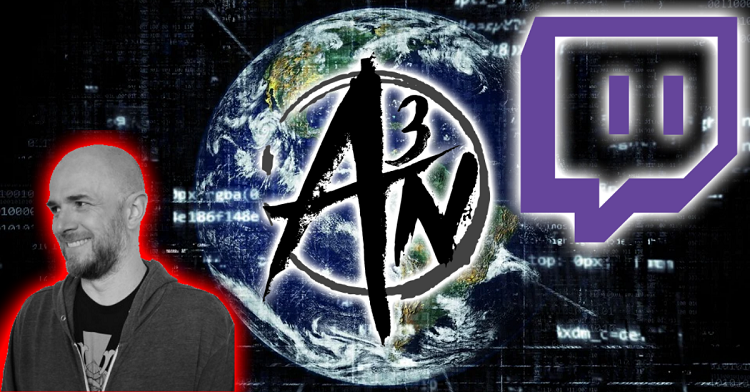
Intellectual Property and Twitch – Natural Enemies
On the 22nd of October 2020, the creative director for Google Stadia threw a tantrum online. Apparently, he decided to piss off the very people he needs for his job to be successful. For those unaware, the Stadia is a device that allows you to stream games from the Internet, join other people’s streams seamlessly, and do it all for about $10 a month. It also has a free month trial in the beginning. But I’m not advertising this device, nor am I advertising the service, because the people behind it are not only connected to a monopolist behemoth anyway, but apparently they want to spit on the exact industry into which they are entering. This is why their creative director, Alex Hutchinson, essentially called all streamers grifters in a barrage of tweets demanding that they pay a license fee in order to stream gaming content. Yep. I’m serious.
So, I thought this would be a good opportunity to go over his claims, refute them, and use it as a platform to discuss why intellectual property (IP) is a trash concept which should be thrown in the dustbin of history. Let’s start with his first words.
“Streamers worried about getting their content pulled because they used music they didn’t pay for should be more worried by the fact that they’re streaming games they didn’t pay for as well. It’s all gone as soon as publishers decide to enforce it,” Alex whined. “The real truth is the streamers should be paying the developers and publishers of the games they stream. They should be buying a license like any real business and paying for the content they use.”
Before anything else, let’s talk about the first line where he compares games to music. The glaring difference between the two is one is interactive and one is not. One has many different ways to complete and play the media, and the other is a complete, finished package, entirely self-contained. Because of that, streaming and uploading music is an entirely different animal than streaming and uploading footage from a game. You’re not gonna get the full experience of a video game because of one person’s playthrough, and if that were the case, they wouldn’t sell after the stream was complete. Everything would have already been done, and there would be no incentive to pick up the product at all afterward. The entire games industry would have crumbled by now if this were a viable comparison. On the other hand, music can be listened to in entirety if it is uploaded to a third party service, which means music creators have a much better – yet still nonexistent – claim to an IP violation from their product being uploaded than a game developer has to footage of a person’s gameplay being uploaded.
But a secondary argument here can be made directly from the music comparison. I know from personal experience that one of the ways that I’ve found many of the bands and genres which I now absolutely love, promote, and financially support when I can, is the existence of a wide variety of uploads to YouTube. To be clear, this wasn’t always legal. And it still maintains a legal gray area to this day. But without the broad catalog of YouTube, my music tastes would likely still be very narrow, and I would venture to guess that it would also be narrow for a lot of other people. My experience is not that unique, even though my music taste could be described as a “fever dream” on a good day. Essentially, because of piracy, I now support a lot of less known artists, and regularly boost their content. This became common enough that YouTube began officially seeking licenses from record labels, and independent artists, in order to share the revenue directly with them from their music streams.
Now, to be clear, this has led to one of the worst AI systems on the planet. And that AI system regularly damages the careers of people who use content in a fair use context. So, I’m not saying Google got it right here either, but it is ironic that a man working for a company who currently profits off of what was originally illegally uploaded content, and a platform which found a way to make that work, is now melting down over streamers on Twitch doing the exact same thing with video games. Again, a practice for which the Stadia is purpose-built. But the reasons he’s biased become crystal clear when you look at his bio. “Creative Director @ Google Stadia! Previously Journey to the Savage Planet, Far Cry 4, Assassin’s Creed 3, Spore, Sims 2 etc.” He’s not interested in the history of IP “violations” leading to a beautiful bloom in creativity. I can’t mention to him the fact that a ton of popular artists from Daft Punk to Kanye West got their start, and sometimes whole or instrumental parts of their careers off other peoples’ sounds. He won’t have a conversation about how sampling drives innovation, and how the DJ circuit blows up underground artists. He doesn’t care because he feels personally slighted as a developer, and he’s too spoiled to see that he’s essentially getting free advertising and a sponsor deal most brands would maybe literally kill for. He’s blinded.
The question is, then, why is all this coming up now? Well, Twitch spammed emails at people claiming their channels violated copyright law and destroyed a ton of their content. The emails read, “We recognize that by deleting this content, we are not giving you the option to file a counter-notification or seek a retraction from the rights holder. In consideration of this, we have processed these notifications and are issuing you a one-time warning to give you the chance to learn about copyright law and the tools available to manage the content on your channel.”
So, why did they send these messages? They recently introduced a more streamlined experience for sharing licensed tracks on their platform called “Soundtracks”. Presumably, part of the agreement with license holders was to crack down on copyright infringement on their site. Problem is, a lot of officially licensable music is available in video games played on the platform, and Twitch doesn’t have all the licenses for all those songs, so this deal probably means that they have a lot more crackdowns that they will have to do, including this one. Depending on the game, this could absolutely destroy the streaming ecosystem on Twitch.
Why is this a problem, and why should development companies care about this? Aren’t they being ripped off? Isn’t this guy right? The answer is that streaming has been extremely beneficial to the games industry, not only for having improved quality of games due to the public review and criticism process available in a platform like Twitch, but also due to the fact that it increases the lifespan of retro games, and amplifies the visibility of indie games which otherwise would not see as much of the light of day in a paper published on ResearchGate, The Binding of Isaac, Minecraft, FTL, Don’t Starve, Kerbal Space Program, Prison Architect, Darkest Dungeon, Stardew Valley, and Cuphead, among others, have all seen critical success due to their popularity on streaming platforms. The article says:
“Twitch has become an important site for boosting the visibility of independent games, whereby streamers serve in lieu of a larger formal advertising budget and labour is performed by streamers who benefit both themselves and the games’ developers through their actions; equally… the platform has served to offer informal ‘reviews’ for less visible games that might not ordinarily be covered by the mainstream gaming press. Twitch has been instrumental to the scale of the success of numerous independent games which have found visibility on the platform, and consequently purchases from a wider demographic. However, Twitch and live streaming have not just affected the success of independent games; they have also led to ‘second lives’ for much older games, expanding the viable lifespan of video games beyond traditional expectations and thereby adjusting how developers think about games, but also how games culture and history are curated. Most prominently, the community around ‘speedrunning’ – completing a game, or a fixed portion of a game, as quickly as possible (Scully-Blaker, 2016) – has brought a wide range of old games back into vogue years, or even decades, after their initial release (and the expected decline, with age, in their popularity).”
This sentiment isn’t exclusive to this article, and it’s almost universally shared by the gaming community. Maybe not some developers, especially developers who work on franchises which rely on sequels and a long term package of DLC to stay afloat (looking at you, EActivisBisofThesda), but for the vast majority of developers out there, many of whom are indie, it’s very helpful to have a dedicated group of people with the self-interest necessary to promote your product, without you even needing to pay them. In fact, it’s so common that many streamers and game reviewers in general get “review copies” of the game, meaning officially licensed copies from the developer to type up the game before release. If this isn’t evidence that the field is profitable to them, I don’t know what would be, and I especially think it’s worth highlighting that many of the most popular games out right now are successful because of streamers. Take Fortnite, for instance.
Why is all this appearing on an anarchist website, though? Well, because I think it’s yet another example of corporations imitating the state and using state authority to suppress that which does not appeal to their particular current profit motive. And it’s also always good to think about IP broadly speaking, because in general, it’s bad for consumers, content creators, and artists.
In the conclusion of that article, the authors go on to say, “[we] believe that further exploration of live streaming is crucial not just for understanding where the games industry is now, but also where it is going in the future; a future which appears increasingly democratised, and increasingly open to new actors.” I couldn’t agree more.
The arrangement was working fine for the vast majority of people involved with it, and in general, there were no hiccups. People would share what they liked, and people who saw what they liked often went out and bought it, supporting many musicians, game developers, and more. All because of a totally anarchic relationship whereby people chose to make a profit out of pursuing their passions. But then the old enemy of anarchists reared its ugly head. That is, intellectual property – a thing that has been used to stifle much rebellious media through the times. And I’m not saying that a Twitch streamer making a Minecraft mod is rebelling much, but what I am saying is that we have the same enemy: overzealous corporations using statist means to silence people who aren’t behaving with their property the way the state or corporations want them to. Because of this victimless offense, a ton of people whose livelihood depends on their content have lost their content. And a ton more in many other instances of intellectual property action have been sued and even jailed. It is my opinion that the threat of intellectual property claims somewhere is the threat of intellectual property claims everywhere, and that this threat represents one more tendril of the mighty hydra that is the state. It invades all aspects of our lives, whether we want it to or not. At least for now.
And I believe this slight rant to be a representative of the petty tyranny implied in using statist means to settle your personal beefs with people who do not harm you, but still don’t do what you want.
The real truth is that streamers already paid developers massive amounts of money in the amount of advertising budget they don’t have to generate as a result of self-motivated actors essentially behaving in the exact way proposed by Human Action – spontaneous order, allowing for beauty to arise from voluntary market interactions. Streamers shouldn’t have to worry about getting their content pulled for using any sort of media which they’re adequately reviewing, nor should they have to pay a license fee for the privilege of advertising somebody else’s product. It’s as ridiculous as being unable to drink Coca Cola in public because you didn’t pay Coca Cola for the privilege of being seen with their product. It’s this sort of corporate fascism that pervades a significant amount of modern market interaction, and it’s all because the state empowers people to be as vindictive as possible in their pursuit of profit. Alex Hutchinson specifically complains that right now it’s a grey market. I say bully for the gray market! If you meant to distract people from the vapid, oily, philosophically bereft ideas he’s spewing, he shouldn’t have used our language to try and dissuade our action. The only thing he does is encourage it, which is why, even though Twitter has temporarily made it more difficult to retweet people, he is still being ratio’d. You love to see it.
He accuses streamers of providing no value, and essentially stealing the game for a host of other people, but if that were the case, the demonstrable market success of a variety of games due to the streaming industry would not be something I could point to, nor would it be included in research papers about the subject. He claims streamers aren’t marketing games, but marketing themselves using games, but if that were a real paradigm, most sponsored athletes are not actually marketing the product, they’re “marketing themselves using the product”. Same with product placements in movies, personalities doing ads (think Terry Crews Old Spice ads), and a variety of other valid advertising techniques which have led to the success of many brands. This flies in the face of all advertising history, and spits on not only the way marketing has worked, but the way marketing can work.
But he doesn’t care. He’s a self-interested, profit-driven, corporate shill. And he doesn’t care about facts or reality, only his precious bottom line. If he has to use the power of the state to crush a few small people trying to make a name for themselves, despite the value they provide and the demonstrable benefits of a democratized content creation system, he will. And he would love to do it already. That is, if he weren’t a massive hypocrite. Right after his rant, he bowed out of all discussion, claiming he was going to hop online and stream Fall Guys. Another thing you’ll love to see, is all the comments demanding that he pay the developers of Fall Guys royalties. As far as I’ve seen, he’s declined to comment. Because people who hide behind the state are cowards, and ultimately disinterested in reasoned dialogue. The state is a hammer, and when you’re at hammer, all problems start to look like nails. And you want a lot of nails, because it keeps you in the hammering business.
In summation, just keep in mind that if your favorite streamer goes offline, this salty developer and his statist crony friends might be the reason it happens. When people start to make this sort of wave, it often gets accepted later, and we all know, due to the lockdown, that power is being transferred from the little people to the government in corporate class, who can afford the mass business shutdowns that are plaguing us all.
And while they destroy the economy, these bastards won’t even leave us alone with our entertainment; even that has to be subject to their authoritarianism. It’s just something to remember – as long as the state exists, it will be cancer upon us all, and ultimately, until we do away with it, we’ll have to deal with tyrants like Alex, butting their tyrannical noses into things that don’t hurt them, in order to inflict the control of an external mechanism, because they don’t have the stones to do it themselves. Because the state is a mechanism for the weak to imagine themselves strong, not a system to empower the strong to become stronger. That’s why they want you servile. The moment you stand up is the moment they no longer have what they have wormed their way into obtaining, the pretense of authority.
I think it’s time we give ‘em a dose of reality, don’t you?







